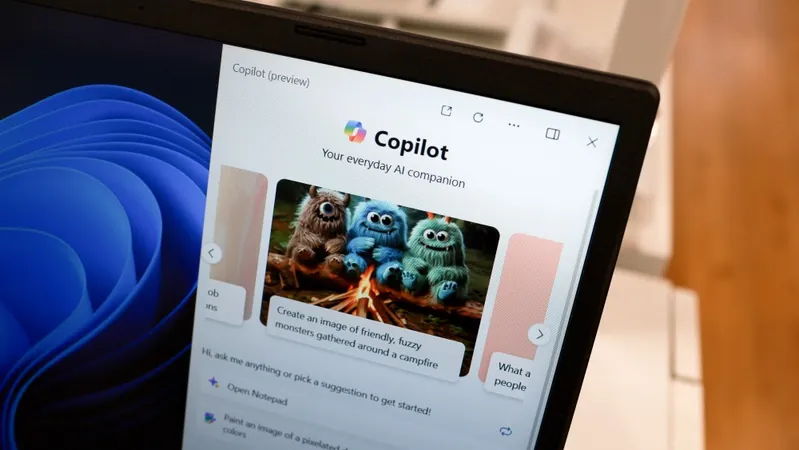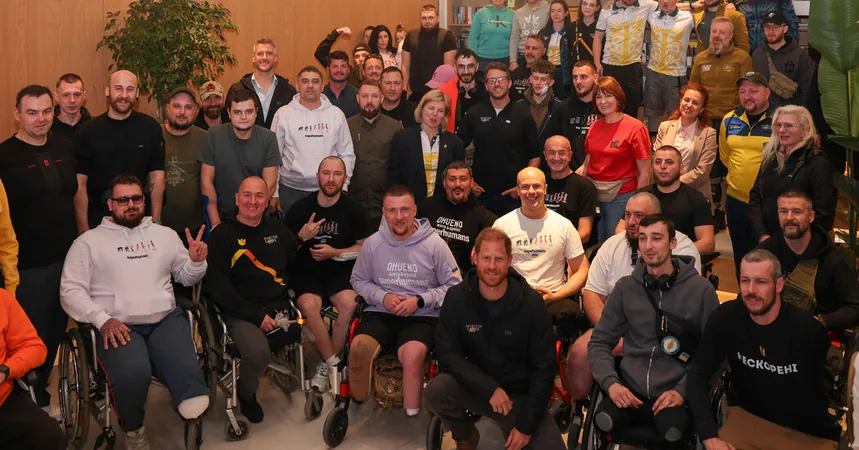
Microsoft Copilot AI Launch Disrupted by Pro-Palestinian Demonstrations
2025-04-04
Author: Ying
In a dramatic turn of events at Microsoft’s headquarters in Redmond, Washington, the launch of their groundbreaking AI software, Copilot, was interrupted by passionate protests over the company's ties to military applications used in the ongoing conflict in Gaza.
Mustafa Suleyman, CEO of Microsoft AI, was midway through an enthusiastic presentation detailing the advanced features of Copilot when a young woman wearing a hijab approached the stage, vehemently criticizing Microsoft’s involvement in militarized technology. “You claim that you care about using AI for good, but Microsoft sells AI weapons to the Israeli military. Fifty thousand lives have been lost,” she exclaimed, drawing attention to the humanitarian crisis in the war-torn region. The protestor held a checkered scarf symbolizing her support for the Palestinian cause, intensifying the emotional atmosphere.
Suleyman, maintaining composure in the face of disruption, acknowledged her protest by stating, “I hear your protest.” Despite the emotional charge of the moment, he continued with his presentation which included participation from two everyday users of Copilot, showcasing its designed functionalities.
The situation escalated when around 30 more protesters arrived, chanting “Free Free Palestine” and bringing drumbeats that echoed through the venue. The intervention of Microsoft security and local authorities ensured the event proceeded without significant interruption. Following the melee, attendees largely shifted their focus back to the advanced technology unveiled, notably the personal and proactive capabilities of Copilot.
Microsoft’s Copilot, launched earlier this year, aims to revolutionize user interaction with technology, positioning itself as a “personal companion.” It leverages AI to anticipate user needs by integrating seamlessly into their daily digital lives. During the event, Suleyman described Copilot as more than just an assistant—it’s a system that evolves with the user over time, becoming adept at personal preferences and behaviors.
Microsoft plans substantial enhancements to Copilot to ensure it remains intuitive and interactive. Key updates include memory personalization, enabling the AI to remember critical details like favorite foods and birthdays; task automation, where the AI can book tickets or reservations on behalf of users; and visual interaction, allowing integration of the user’s camera for real-time guidance based on surroundings.
Further emphasizing the integration of AI into daily tasks, the company highlighted partnerships with major digital commerce platforms to enrich the Copilot experience, seamlessly assisting users with shopping, travel bookings, and even creating tailored podcasts on requested subjects.
While the significant investment in AI places Microsoft at the forefront of generative technology, it also raises ethical questions regarding the use of such tools in conflict scenarios. The juxtaposition of celebrating a technological milestone amid societal turmoil sparked a critical conversation about the responsibility of tech giants in influencing global affairs.
Microsoft has navigated the landscape of AI with its partnerships and innovations, but the launch event serves as a reminder that corporate responsibility and social activism are becoming increasingly intertwined in public discourse. As consumers grow more aware, the pressure mounts for corporations to ensure that advancements in technology align with ethical standards and human welfare.
The spectacle of the protest amid a major product launch illustrates the growing voice of activism in technology spaces, demanding accountability from companies that wield significant influence over contemporary issues. As the dialogue continues around Microsoft’s role in the AI revolution, one question persists: how will the company balance innovation with responsibility in a rapidly evolving social landscape?




 Brasil (PT)
Brasil (PT)
 Canada (EN)
Canada (EN)
 Chile (ES)
Chile (ES)
 Česko (CS)
Česko (CS)
 대한민국 (KO)
대한민국 (KO)
 España (ES)
España (ES)
 France (FR)
France (FR)
 Hong Kong (EN)
Hong Kong (EN)
 Italia (IT)
Italia (IT)
 日本 (JA)
日本 (JA)
 Magyarország (HU)
Magyarország (HU)
 Norge (NO)
Norge (NO)
 Polska (PL)
Polska (PL)
 Schweiz (DE)
Schweiz (DE)
 Singapore (EN)
Singapore (EN)
 Sverige (SV)
Sverige (SV)
 Suomi (FI)
Suomi (FI)
 Türkiye (TR)
Türkiye (TR)
 الإمارات العربية المتحدة (AR)
الإمارات العربية المتحدة (AR)